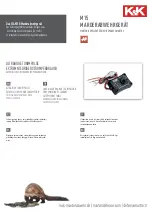
82
5.1.2.
SNMP SET
The SNMP SET is a write (output) command that allows control of SNMP-enabled equipment by sending them specific
commands over an IP network.
The Davicom SNMP SET commands behave much like SPDT relays since they send one of two values, normal and active,
but also because the Cortex controls (activates) SNMP SETs in the exact same way as it controls its relays, using boxes
called “Controlled By” found in most of the Cortex’s input menus.
SNMP SET commands are ephemeral (momentary), meaning that each send (or write) is unique and doesn’t repeat.
For each SNMP SET command sent, the Cortex nevertheless waits and listens for an acknowledgement message from the
remote device. This acknowledgement message provides information on the success or failure of the SET command sent.
In the event that this message contains a failure notice, or if no message at all is received, the Cortex can be set to generate
an alarm (see #14 in the menu screen below) in order to advise users that a particular SET command did not attain its
destination.
Please see Section 4.3.14.3 for the details about the generic
Main
screen,
Description
screen and
Vocal Description
screen.
1 –
ID
ID of the selected SNMP SET output. Select from the drop-down menu.
2 –
I/O DESCRIPTION RETREIVAL
Click to retrieve and display the current normal description of that ID. Normally hidden to minimize data transfers
on low speed or high fee data connections.
3 –
IP ADDRESS
IP address of the SNMP device.
4 –
OID
OID of the control point in the SNMP device.
5 –
VERSION
Version number of the SNMP used by the Cortex for the selected SET command. Must be of the same version as
the one used in the SNMP device.
6 –
ACTION TYPE
Selects the action type that will happen when a SET command fails to activate in the remote device or equipment.
3 types are available: Major alarm, Minor alarm, and Command (CMD). On CMD, no alarm will be triggered. Use
this Action when you want to take actions without triggering any alarms (like building logic to re-send the command).
Summary of Contents for Cortex Series
Page 2: ...2...
Page 5: ...5...
Page 9: ...9 1 3 Specifications...
Page 18: ...18 2 4 2 Jumpers for the Cortex 320 Jumpers and switches location on the Cortex 320 main board...
Page 91: ...91...











































